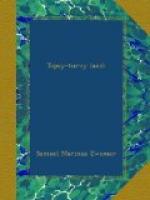Muscat in Arabic, means “the place where something falls.” And the surroundings are so rocky and steep that everything has a chance to tumble down except the mercury in the thermometer. That is always up high. In this hot, crowded town, the Arabian Mission opened its third station in the year 1893. Two years before the veteran missionary-bishop, Thomas Valpy French laid down his life here, and the fallen standard was taken up by Peter J. Zwemer. After five years of toil in Oman, he also entered into rest. George E. Stone, his successor in Oman, was also worthy of the martyr’s crown, and his simple grave at Muscat tells how “he arose, forsook all, and followed Christ.”
This part of Arabia is sacred because of what these three pioneers suffered to open the door for the gospel. I do not think the King will leave a province where He has buried so much treasure in the hands of the enemy, do you? The work of preaching in Oman is at present full of promise, and the people seem willing to hear. The American Bible Society is sending the Scriptures all over Eastern Arabia.
[Illustration: MUSCAT HARBOUR.]
The last mission station in Arabia we mention, is the first that people generally visit. Aden is a coaling station as well as a missionary centre and passengers travelling to the Orient nearly always stop here on the way. There are Christian churches and hospitals and government schools. At Sheikh Ottoman, a short distance from Aden, Ion Keith Falconer, the first modern missionary to this land, began his work. He died here also, but his life was so full of love and sacrifice that his work is still going on. The Free Church of Scotland mission has medical work, an industrial school for waifs and a memorial chapel. From a great distance patients come to be cured, and Moslems to buy the Bible.
The great lighthouse on the island of Perim, near Aden, throws its light for ten miles out on the dark sea and saves ships from the breakers. But the light of the gospel in the Bible depot at Aden, shines two hundred miles to the north as far as Sanaa, and three hundred miles east to Makalla on the coast. Yet I dare say it costs more to keep up the lighthouse at Perim (not to speak of building it) than it does to keep open all the Bible lighthouses of all Arabia. Perhaps Keith Falconer thought of this when he said in his farewell address:
"We Christians have a great and imposing war office, but a very small army. While vast continents are shrouded in almost utter darkness and hundreds of millions suffer the horrors of heathenism and Islam, the burden of proof lies upon you to show that the circumstances in which God has placed you, were meant by Him to keep you out of the foreign mission field."
Before you lay aside this book, will you not ask yourself why you should not go out to Arabia, or to some other land yet shrouded in darkness, and shine for Jesus?




